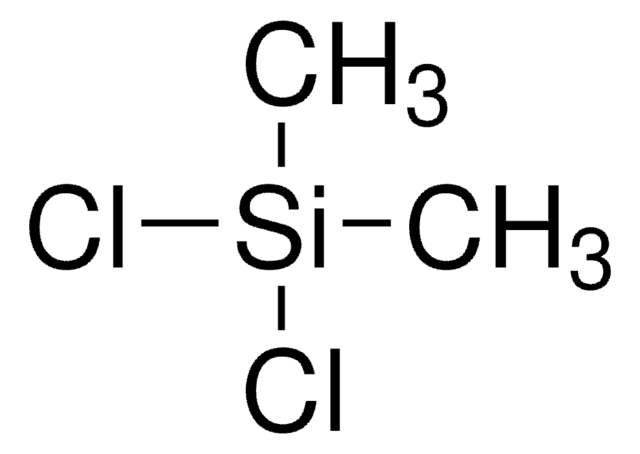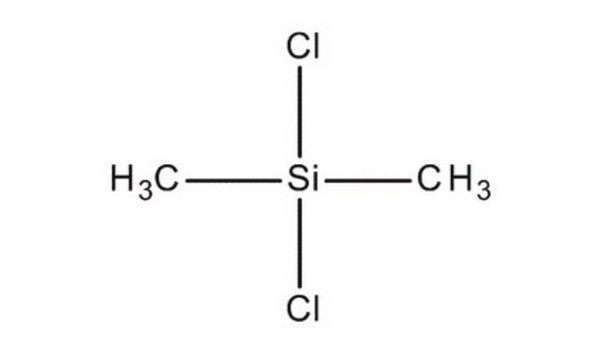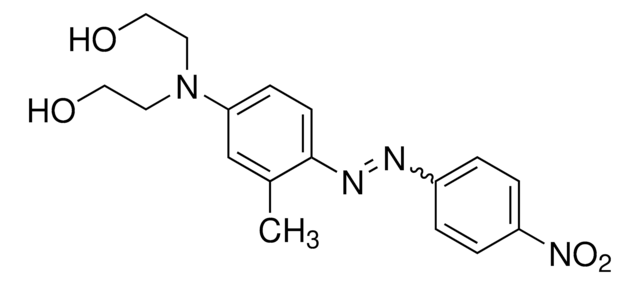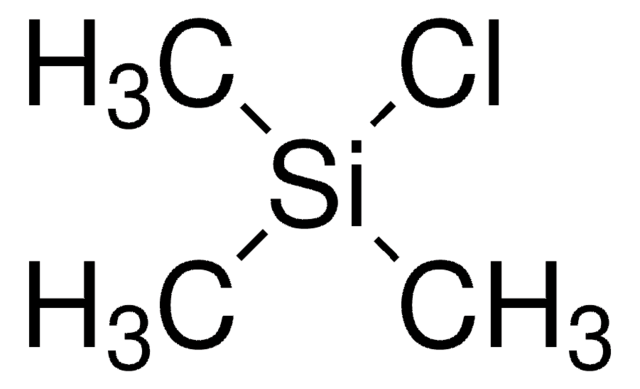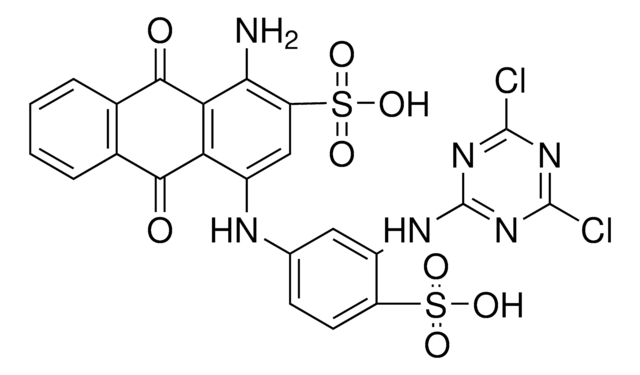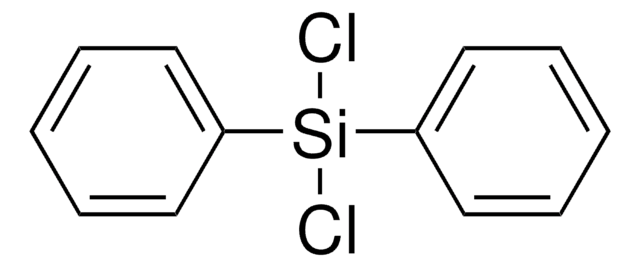80430
Dichlorodimethylsilane
produced by Wacker Chemie AG, Burghausen, Germany, ≥99.0% (GC)
동의어(들):
Silane M2, DMDCS, Dimethyldichlorosilane
로그인조직 및 계약 가격 보기
모든 사진(1)
About This Item
Linear Formula:
(CH3)2SiCl2
CAS Number:
Molecular Weight:
129.06
Beilstein:
605287
EC Number:
MDL number:
UNSPSC 코드:
12352101
PubChem Substance ID:
NACRES:
NA.22
추천 제품
Grade
produced by Wacker Chemie AG, Burghausen, Germany
Quality Level
분석
≥99.0% (GC)
양식
liquid
refractive index
n20/D 1.404 (lit.)
bp
70 °C (lit.)
mp
−76 °C (lit.)
density
1.07 g/mL at 25 °C (lit.)
SMILES string
C[Si](C)(Cl)Cl
InChI
1S/C2H6Cl2Si/c1-5(2,3)4/h1-2H3
InChI key
LIKFHECYJZWXFJ-UHFFFAOYSA-N
유사한 제품을 찾으십니까? 방문 제품 비교 안내
일반 설명
Dichlorodimethylsilane is an organosilicon compound generally used as a protecting group for diols and carbonyl compounds. It is also used as a starting material for the preparation of silicon-based reagents.
애플리케이션
Dichlorodimethylsilane can be used:
- As a silane coupling agent in the synthesis of silica nanoparticles and in their surface modification studies.
- To prepare polydimethylsiloxane microemulsions by reacting with sodium dodecylpolyoxyethylene sulfate.
- To prepare a novel heterasumanene where the benzylic carbon atoms of the sumanene are replaced by heteroatom (S, Si) functionalities
기타 정보
prices for bulk quantities on request
신호어
Danger
유해 및 위험 성명서
Hazard Classifications
Acute Tox. 3 Inhalation - Acute Tox. 4 Oral - Eye Dam. 1 - Flam. Liq. 2 - Skin Corr. 1A - STOT SE 3
표적 기관
Respiratory system
Storage Class Code
3 - Flammable liquids
WGK
WGK 1
Flash Point (°F)
33.8 °F - closed cup
Flash Point (°C)
1 °C - closed cup
개인 보호 장비
Faceshields, Gloves, Goggles, type ABEK (EN14387) respirator filter
이미 열람한 고객
P Mondal et al.
Talanta, 83(5), 1482-1486 (2011-01-18)
Polypyrrole nanoparticles of desired structure have been synthesized through simple micelle technique. It is then grafted with functionalized silica gel to develop a novel organic-inorganic hybrid material. The role of dimethyl dichloro silane (coupling agent) in grafting is demonstrated. The
Zhanhui Wang et al.
Journal of biochemical and biophysical methods, 57(3), 203-211 (2003-09-27)
The feasibility of using protein A to immobilize antibody on silicon surface for a biosensor with imaging ellipsometry was presented in this study. The amount of human IgG bound with anti-IgG immobilized by the protein A on silicon surface was
K R Kamath et al.
Journal of biomaterials science. Polymer edition, 7(11), 977-988 (1996-01-01)
Dimethyldichlorosilane (DDS)-treated glass (DDS-glass) was modified with either poly(ethylene oxide) (PEO) films or poly(N-vinyl-2-pyrrolidone) (PNVP) films by plasma polymerization. The thickness of the plasma polymerized films was varied between 40 and 700 nm. The results showed that the hydrophilic plasma
Y C Tseng et al.
Biomaterials, 16(13), 963-972 (1995-09-01)
Amphipathic ethylene glycol-butadiene block copolymers (PEG-PB) with different chain lengths of poly(ethylene glycol) (PEG) were synthesized by reacting poly(ethylene glycol methyl ether) (m-PEG, mol. wt = 350, 550, 750, 2000 and 5000) with telechelic polybutadiene (PB). The PEG-PB copolymers formed
Wonmi Ahn et al.
ACS nano, 4(7), 4181-4189 (2010-06-23)
Uniform hexagonal arrays of diverse nanotemplated metal structures were formed via selective electroless gold plating on particle-lithographed dimethyldichlorosilane layers. Surface-associated water at silica bead interstices was shown to correlate with the formation of silane rings with outer ring diameters ranging
자사의 과학자팀은 생명 과학, 재료 과학, 화학 합성, 크로마토그래피, 분석 및 기타 많은 영역을 포함한 모든 과학 분야에 경험이 있습니다..
고객지원팀으로 연락바랍니다.